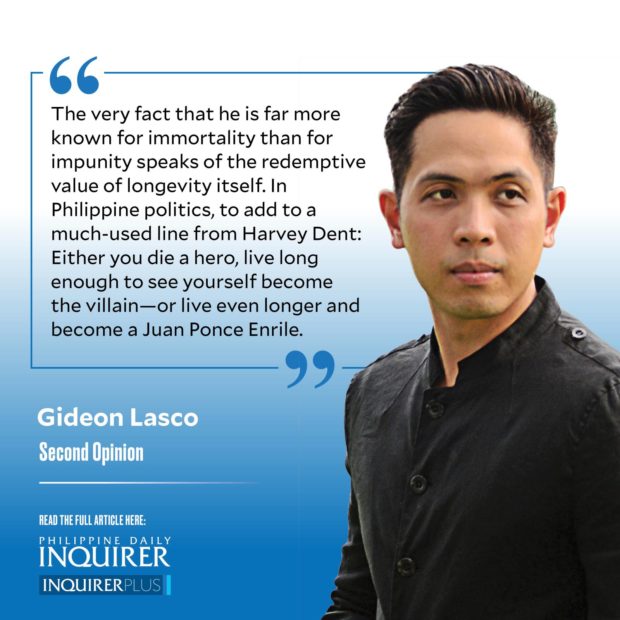On Feb. 14, Juan Ponce Enrile celebrated his 99th birthday with a grand celebration, attended by political heavyweights, including President Marcos Jr. and his fellow nonagenarian Imelda Marcos, reminding people of a trope that’s been running for a decade now: Enrile as the avatar of biological and political longevity.
The memes and tweets, of course, can be quite funny: Enrile having a dinosaur as his first pet, Enrile in the Garden of Eden, Enrile surviving countless plagues and pandemics, Enrile being older than many things—from the discovery of penicillin to the inauguration of the Third Reich. At one point, I joined the fun by tweeting about “nine lives of Juan Ponce Enrile,” from Marcos’ Minister of Defense and Edsa leader to Senate president and plunder suspect.
I would be proven wrong, of course, in implying that his final act is that of infamy—and today, the indefatigable Enrile is chief presidential legal counsel: The latest in many positions that span eight administrations, including two Marcoses and two Aquinos.
For understandable reasons, many have taken interest in the health and wellness “secrets” of the 99-year-old former Senate president, and countless articles have been written about this theme. Over the years, he has indulged journalists with some responses, from eating saluyot to exercising regularly. Not surprisingly, how he coped with COVID-19 was also the subject of public attention—including his reported use of virgin coconut oil (VCO) and ivermectin.
As a medical anthropologist, I’m more interested in how these practices—and people’s perceptions of them—reflect on our society and our notions of longevity—beyond the actual efficacies, if any, of any of his prescriptions.
Some, for instance, give credence to the widely circulated rumor that he resorted to stem cell therapy.
One of the earliest explanations—at a time when his old age was only beginning to become meme-worthy—was stem cell therapy, which was itself just emerging as a medical procedure at the time. “In a country where many elite are obsessed with anti-ageing, wealthy Filipinos are shelling out between $12,500 and $18,000 per session of stem cell therapy in the belief it will improve their overall health and make them look younger,” as one AFP news report noted in 2013, citing Enrile as one of the patients of Villa Medica in Germany alongside Imelda and former president Joseph “Erap’’ Estrada—even as the Department of Health warned that it was an unproven anti-aging procedure.
Other therapies are less dramatic, but no less interesting. The resort to VCO, during COVID, is consistent with people’s turning to this product in past outbreaks, including the SARS outbreak in 2003; promoted by our scientists on both scientific and nationalistic grounds. As for ivermectin and its promotion by politicians, it is a clear case of what my research associate Vincen Yu and I call “pharmaceutical messianism” in a 2022 article in Social Science and Medicine.
As for Enrile’s longevity, however, I think the explanation is far simpler: As a man of extreme privilege, Enrile has access to the best health care, at a time when health care has progressed to greatly increase life expectancy. This is the same reason why Imelda is now 93; Duterte, 77; Erap, 85: all of the them far beyond the 72-year life expectancy of the average Filipino. Surely, regular exercise, healthy diet, and genetics are likewise important factors, but even the ability to eat well and exercise regularly require a lifestyle that many Filipinos don’t have access to.
Meanwhile, there are also popular explanations of Enrile’s longevity that verge on the mystical, most notably the adage, “Ang masamang damo mahirap mamatay.” Enrile, after all, has outlived all the major protagonists of 1986, including Cory Aquino, Cardinal Sin, Fidel Ramos, and Joma Sison. And he has survived a fake ambush, various arrests and indictments, charges of sedition and corruption; even today, he faces a plunder charge but is free because of—in the Supreme Court’s words—his “fragile health and advance age.”
Astoundingly, he has not only managed to physically survive, he has also managed to resurrect his political career several times, losing elections in 1998 (as presidential candidate), 2001 (as senatorial candidate), and 2019 (again as senatorial candidate), only to return to the national stage in glory.
Again, in this, there is no secret other than the country’s political realities; the very fact that he is far more known for immortality than for impunity speaks of the redemptive value of longevity itself. In Philippine politics, to add to a much-used line from Harvey Dent: Either you die a hero, live long enough to see yourself become the villain—or live even longer and become a Juan Ponce Enrile.
——————-
glasco@inquirer.com.ph


